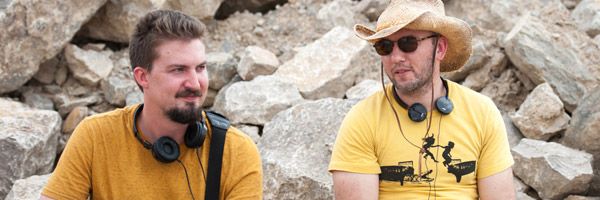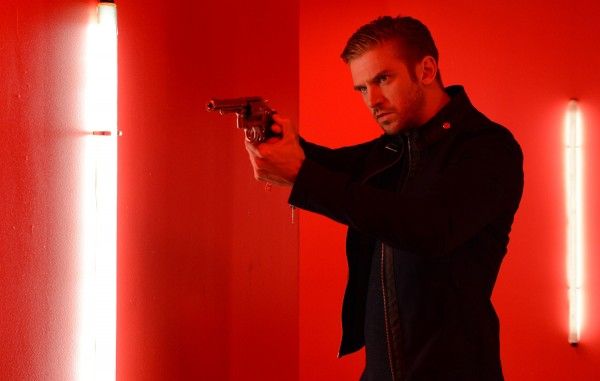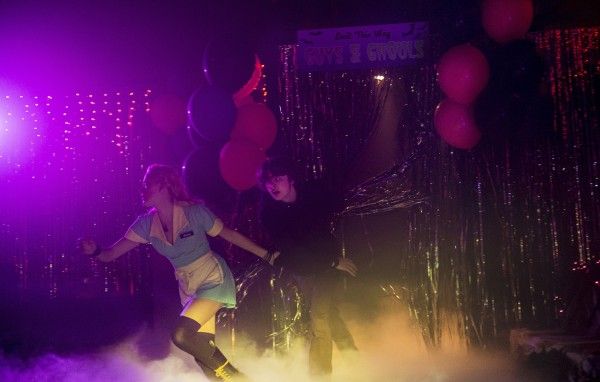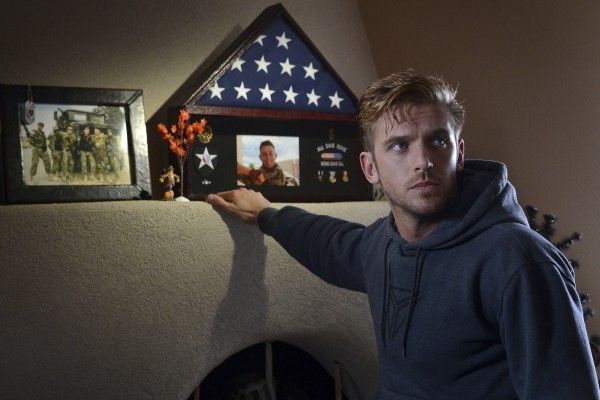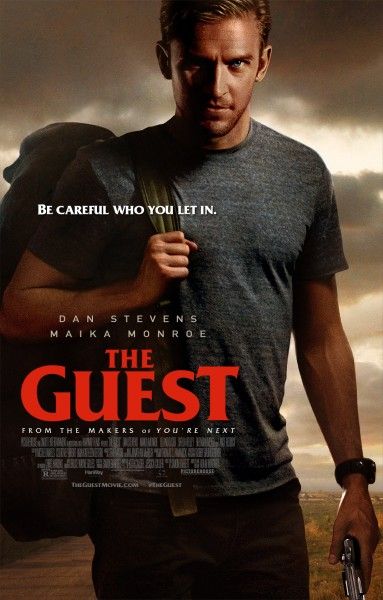The Guest is easily one of the best times you'll have in a theater this year. It's funny, full of action, smart, and extremely stylish. Three years ago I wouldn't have thought Dan Stevens from Downton Abbey would be a contender as an action star/serious badass, but I would have been wrong. He's on fire here (as you can probably tell by the film's trailer). So are director Adam Wingard and writer Simon Barrett (A Horrible Way to Die, V/H/S/2, You're Next), who continue to mine the genre field and find interesting ways to make their material relatable and exciting.
I recently sat down with Wingard and Barrett to talk about the film. I should note that I've interviewed the duo many times in the past, so I wanted to go a little bit off the beaten path with my questions here and focus solely on aspects of The Guest (and their career) that we hadn't discussed before. I also tried to dig a bit into what they're next project is, but that question was answered far more successfully yesterday. Hit the jump to check out the interview (and be sure to read Matt's review). The film also stars Maika Monroe, Leland Orser, Sheila Kelley, Brendan Meyer, and Lance Reddick. The Guest opens in U.S. theaters tomorrow, September 17th.
Collider: When this project was initially announced, I imagined the movie Simon was describing last night [at a Q&A hosted by Nicolas Winding Refn]. I thought, “they’re going to make their boring movie now.” But it’s so fun. Can you talk abut the tone and how you decide where to place that needle?
SIMON BARRETT: It’s interesting what you said [before tape was rolling] about filmmakers being afraid to make fun movies because we were at Sundance or some such place and Adam said this too, that critics conflate movies that aren’t entertaining with movies that have artistic merit. To me, that’s completely false. It’s actually much harder to tell an original story with characters you care about that has a beginning, middle and end than it is to make an alienating, experimental mood piece. I know because we’ve made both. The first thing I think about is who is going to be watching the movie and how we’re going to reward that experience. On top of that, if we want to do anything weird and subversive, we can as long as we adhere to the first rule of making the movie deliver what the audience wants.
ADAM WINGARD: And I think modern warfare has already been covered in that kind of depressing, “war is futile and everyone comes back damaged” way already. That’s kind of the theme of the post-Iraq films of the last decade. So there’s no reason for us to tell you anything you don’t already know about PTSD or anything like that. And, at the end of the day, whenever you make those movies at this point, you’re not really converting anybody to your point of view. You’re just preaching to the choir. We all agree that we’re smarter than the people who love war and all that [laughs]. I don’t even necessarily look at the world through that lens anyway. I definitely don’t like the military-industrial complex, but what if that wasn’t there? I couldn’t tell you what the world would be like because of the way the human race works. What if we did abolish all of our military? There would always be somebody who wanted to take over. So all of these things do serve a weird purpose. A lot of filmmakers who make these statement movies tend to simplify everything. And it’s just not that simple. At the end of the day, we’re genre filmmakers and enjoy making those movies. And when we’re coming at a PTSD film like this, we have to be honest to who we are as filmmakers.
The movie is incredibly vibrant in terms of color.
WINGARD: Sometimes those choices just come from asking, “where is the light coming from in this scene?” If Simon sees it as just natural moonlight, then maybe that’s different from how I think it should be lit. We haven’t run into too much trouble. For The Guest in particular, Simon and I wanted the film to take place during Halloween and so he wrote that in there. In a sense that’s what we’re really talking about. In a sense that created the color palette. And whenever we got to New Mexico, the oppressive sunshine was also a factor and was utilized. With You’re Next we went out of our way to avoid any reds because there’s so much blood in the film and we wanted a more sedate color palette. For this one, I think initially I was thinking in those terms but once we got going we realized that keeping it colorful was the way to go.
Going forward, is there a generalized sense of how you want the filmmaking experience to evolve for you guys?
WINGARD: It’s not that I have a budget number in mind or that I think we should be doing a certain type of movie or anything. Ultimately I just want to be able to make whatever movie we want to make in the most optimum conditions possible. And that probably does mean more money, but it doesn’t necessarily mean a lot more money. We had plenty of money to make The Guest but I would definitely like more days to shoot a movie. The thing I think that separates real filmmakers from people who just make movies is the ability to actually dig into a scene and find out everything about it that you can as opposed to just shooting it. I’m just so sick of having to rush through a sequence and not have more than seven takes. I would prefer to be doing twenty or thirty takes on any given shot, but right now I don’t have that time. The thing is, every take you do you find something else and the performances get better and more interesting. Almost always when I’m editing I won’t even look at anything before the last three takes. That’s where I’ll usually start. If one of those three takes doesn't seem like the best one, I’ll go digging into all of the stuff from before.
BARRETT: And speaking to that question in a broader sense, I think the goal, no matter what movie we’re doing, is to really just not repeat ourselves. We want to keep doing things that we enjoy as viewers but also things we haven’t seen before. So whatever we do next, it’s not going to be like The Guest.
WINGARD: For me as a director specifically. I try to take chances on things I’m not comfortable with on each film. After A Horrible Way to Die, on You’re Next, I tried to solidify my shooting style a little bit more. I wanted to try a more mainstream style. And when it came to The Guest, because of the super-soldier nature of Dan’s character especially, I really wanted to push myself not to fall back on any of my normal handicaps, which meant avoiding more handheld camerawork.
BARRETT: For me The Guest was in some way returning to A Horrible Way to Die, which was more of a character study. This is more about immersing yourself in these characters, since You’re Next was more of a plot-driven film. The Guest is much more about establishing character relationships and dynamics and shifting those and seeing where it goes. And that was something I wanted to return to, but in a way that was actually entertaining. I think in this movie it’s more clear when we’re kidding.

